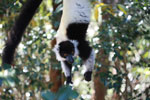
Red-ruffed lemur, a commonly hunted but critically endangered lemur species. Photo by Rhett A. Butler
Britain has authorized the export of thousands of guns to Madagascar, according to TanaNews.com, sparking concerns that the firearms could be used for hunting endangered lemurs.
Data from the UK government’s Strategic Export Controls website shows that licenses for the export of 3,174 guns to Madagascar were granted between August 2011 and June 2012. Most of the weapons were for anti-piracy activities, but 190 sporting guns — guns specifically intended for hunting — and 200 combat shotguns were not designated for anti-piracy activities.
Lemurs are found naturally only on Madagascar. In 2012 the International Union for Conservation of Nature determined that over 90 percent of the more than 100 lemur species are threatened with extinction. “As a result, we now believe that lemurs are probably the most endangered of any group of vertebrates,” said Christoph Schwitzer, the Head of Research at Bristol Zoo Gardens and a member of the IUCN Species Survival Commission’s Primate Specialist Group, in a statement at the time of the announcement.
Gun ownership has been traditionally low in Madagascar, but a rise in recent years has been accompanied by a sharp increase in gun violence, especially in Southern Madagascar. Since the 2009 coup d’état hunting lemurs with guns for the commercial bushmeat trade has increased such that hunting now constitutes a major threat to lemurs’ continued survival. Researchers from Bangor University in Wales and the Malagasy NGO Madagasikara Voakajy found that “illegal hunting of protected species is becoming a major conservation issue” in Madagascar. Much of the hunting is being done with guns: the researchers report that “Evidence from our local monitors suggests that a large number of the Indri [the largest living species of lemur] were killed by a few individuals who own guns and kill lemurs to sell.”

Weapons for Madagascar in Accepted UK Arms Export Permits. Note: The data above are for licences – not for actual export deliveries, although there is no reason to believe that most would not be delivered. Source.
In December 2012, the Arms Export Controls Committee of the House of Commons met with UK Foreign Secretary William Hague and discussed the committee’s concern (1:48.37-1:51.46) that arms authorized for export to Madagascar for anti-piracy activities might be diverted to non-intended uses. MP Bob Stewart described the quantity of arms involved as enough to “make a pretty good army”. In his response, Mr. Hague failed to provide adequate reassurance that arms are not leaking from armories where they are being held or falling into the hands of arms traffickers.
The recent research article on lemur hunting concluded that “If further extinctions [of lemurs] are to be avoided, urgent action is needed to reduce hunting”. The continual increase of guns in Madagascar would be a good place to begin, starting with the UK stopping gun exports to Madagascar.
Related articles
Replacing lemur meat with insect protein in Madagascar
(12/12/2012) Poaching is a major threat to endangered lemurs in some parts of Madagascar, but a group has come up with an innovative solution to the problem: replace lemur meat with silkworm pupae, a byproduct of silk production.
91% of Madagascar’s lemurs threatened with extinction

(07/13/2012) 94 of the world’s 103 lemur species are at risk of extinction according to a new assessment by the International Union for Conservation of Nature (IUCN) released by the group’s Species Survival Commission during a workshop this week. Lemurs, a group of primates that is endemic to the island of Madagascar, are threatened by habitat destruction and poaching for the bushmeat trade.
Critically Endangered lemurs disperse seeds, store carbon

(11/13/2011) Many tropical plants depend on other species to carry their progeny far-and-wide. Scientists are just beginning to unravel this phenomenon, known as seed dispersal, which is instrumental in supporting the diversity and richness of tropical forests. Researchers have identified a number of animal seed dispersers including birds, rodents, monkeys, elephants, and even fish. Now a new study in the Journal of Tropical Ecology adds another seed disperser to that list: the Critically Endangered black-and-white ruffed lemur (Varecia variegata). Capable of dispersing big tree species, the black-and-white ruffed lemur may even play a big role in carbon sequestration.
Extensive logging, lemur hunting in Madagascar national park despite moratorium

(11/16/2010) A biological survey in Northeastern Madagascar has turned up evidence of extensive logging in Masoala National Park, a UNESCO World Heritage Site renowned for its biologically-rich rainforest. The findings suggest that harvesting of valuable hardwoods—including rosewood, ebony, and palissander—continues despite an official ban on the logging and export of timber.
Lemur hunting persists in Madagascar, rare primates fall victim to hunger
(07/17/2005) While it has been illegal to kill or keep lemurs as pets since 1964, lemurs are hunted where they are not protected by local taboos. Many lemurs are particularly easy targets for hunting because evolution has rendered them ecologically naive in that without natural predators over the majority of their existence, they are less fearful than they should be.